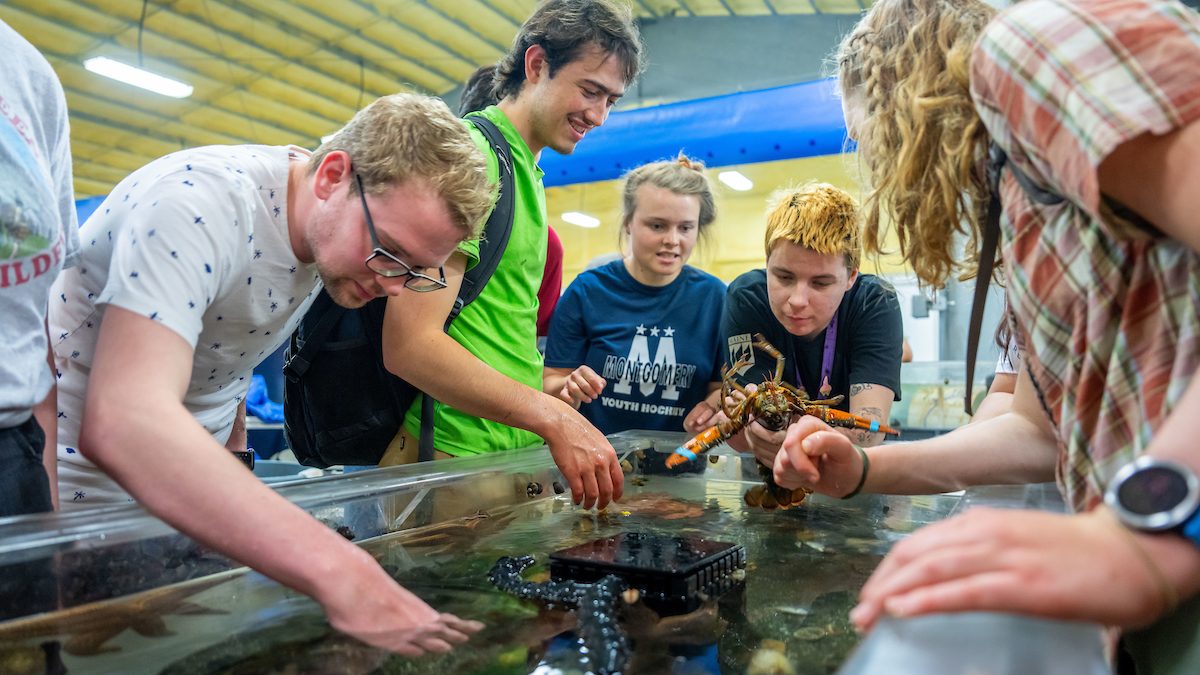
Program to transform aquaculture education through hands-on and virtual experiences
A new program at the University of Maine funded by a $750,000 grant from the National Institute of Food and Agriculture aims to address education gaps and meet workforce needs in the aquaculture industry. The “Activating aquaculture technology learning through hands-on and virtual experiences” program will engage students and educators in interactive, project-based learning experiences centered around Maine aquaculture innovation and technology.
Maine’s aquaculture industry faces educational barriers. A lack of curriculum, training and experiential learning opportunities make it difficult for students, educators and consumers to engage with and understand the aquaculture industry.
“We are trying to increase capacity and reduce the barriers to aquaculture education,” said Carla Scocchi, a 4-H development professional at UMaine Cooperative Extension. “It is such a robust industry and educators don’t often have the capacity to engage their students in it. Our long-term goal is to help improve access to high-quality aquaculture education by getting more materials and resources out there.”
The program is led by UMaine aquaculture experts including Scocchi; Melissa Malmstedt, aquaculture research and education program coordinator and industry recruiter at the Center for Cooperative Aquaculture Research; and Scarlett Tudor, education and outreach coordinator at the Aquaculture Research Institute. Collaboration with Maine Sea Grant, the Maine Aquaculture Innovation Center, and industry partners broadens the scope and impact of the project, increasing aquaculture awareness and engagement among students, educators and consumers across Maine and the nation.
A core element of the program is to use virtual learning to reach underserved communities and raise the quality of aquaculture education. It can be expensive and time-consuming for inland educators and students to take field trips out to the coast where they can see aquaculture farms and technologies firsthand. Virtual field trips will bring learners across the nation to places and people that would otherwise be inaccessible. Supplemental activities and curricula will further aid the teaching of aquaculture systems and technologies. The program also plans to use a set of virtual reality goggles, which will travel along with an educator to classrooms, to deliver an interactive learning experience.
Hands-on learning opportunities offered through the program will help students develop and explore aquaculture systems and interact with aquaculture technologies that ultimately cultivate the skills necessary to pursue a career in the industry. The hands-on experience will also expose students to a range of basic scientific concepts and STEM fields so they can explore their interests.
One component of the program, the 4-H Aquaponics Project, helps educators and students build aquaponics systems. An aquaponics system is a food system where fish and plants work together to grow. Beyond the building and maintenance of the system, the project hopes to develop an additional curriculum that guides students through the design and construction of a water quality monitoring system to support the aquaponics systems they previously built through the project. This would introduce students to applied engineering and software development concepts. Once the students develop their real-time, 24-hour graphic plots of water quality, they will be able to analyze trends and make inferences about the different parameters of water quality and how they affect one another.
Interacting with materials and learning through opportunities like the 4-H Aquaponics Project fosters a better understanding of how basic chemistry, biology, ecology, physics and engineering concepts are connected and apply to aquaculture.
“It lets kids find their spark. Some might be grossed out by the fish part of the tank, but inspired by the growing plants or by the engineering of it,” explained Tudor. “They can pull from this project and follow what interests them further.”
This project also offers interested students with a leadership opportunity to become an Aquaculture Ambassador. Mentored by their expert team, eager students can design their own project-based learning experience related to aquaculture and showcase their findings to the general public through county agricultural fairs and other public events.
These hands-on learning and virtual experiences are designed to be immersive and accessible for students, providing them with real-time insights into Maine’s aquaculture facilities and operations.
The program’s team will draw from participant records, feedback from educators and focus groups to continually improve the program.
Contact: erin.miller@maine.edu
Written by Karalyn Kutzer and Jess Cleary-Reuning
